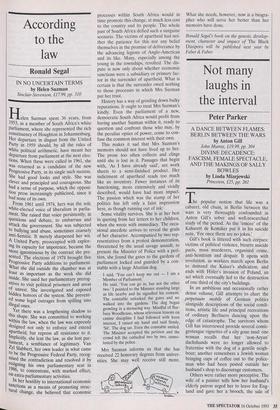Not many laughs in the interval
Peter Parker
A DANCE BETWEEN FLAMES: BERLIN BETWEEN THE WARS by Anton Gill John Murray, £19.99, pp. 304 DIVINE DECADENCE: FASCISM, FEMALE SPECTACLE, AND THE MAKINGS OF SALLY BOWLES by Linda Mizejewsld Princeton, £25, pp. 261 The popular notion that life was a cabaret, old chum, in Berlin between the wars is very thoroughly confounded in Anton Gill's sober and well-researched study of the period. As the 'emcee' of the Kabarett de Komiker put it in his suicide note, 'For once there are no jokes.'
Gill's book is littered with such corpses: victims of political violence, bizarre suicide pacts, mass murderers, organised crime, anti-Semitism and despair. It opens with revolution, as workers march upon Berlin to demand the Kaiser's abdication, and ends with Hitler's invasion of Poland, an act which eventually led to the destruction of one third of the city's buildings. In an ambitious and occasionally rather dense volume, Gill attempts to chart the perpetuum mobile of German politics alongside descriptions of the social condi- tions, artistic life and principal recreations of ordinary Berliners dancing upon the edge of catastrophe. The survivors whom Gill has interviewed provide several comic- grotesque vignettes of a city gone mad: one woman recalls that her 'non-Aryan' dachshunds were no longer allowed to fraternise with the dog of a gentile neigh- bour; another remembers a Jewish woman bringing cups of coffee out to the police- man who had been posted outside her husband's shop to discourage customers.
Others were rather more perceptive. The wife of a painter tells how her husband's elderly patron urged her to leave for Eng- land and gave her a brooch, the sale of which would keep her for three years.
Two weeks later, Frau Minden committed suicide. She did it in an orderly way, with great dignity and no fuss, distributing her treasures to her friends beforehand, and dis- guising her death as heart failure. She was too old to start life afresh in a new country; she had no dependants, and she knew what was coming.
Gill has a good eye for such stories, and for the resonant image. One chapter ends with Hitler chopping down the lime trees on Unter den Linden to make room for military processions. As well as telling us much about Hitler's megalomania, his hatred of Berlin and his lack of aesthetic judgment, this act of vandalism also ful- filled the prophecy of an old song which ran:
As long as the old trees bloom on Unter den Linden, Nothing can defeat us — Berlin will stay Berlin.
He does not always succeed in mar- shalling his material as well as this, and there are occasional repetitions and losses of focus. His discussion of British writers in Berlin is enthusiastic but oddly placed in the text and rather muddled. He uncon- vincingly asserts that
in the early Thirties Christopher Isherwood telegraphed W. H. Auden: 'Come to Berlin. Berlin means boys'.
Since Auden visited Berlin before Isher- wood did — he arrived in 1928 and was followed by Isherwood in 1929 — any such telegram would have been going the wrong way, as well as being very old news by the early 1930s. The mistake, however, is sig- nificant, since Isherwood is so closely iden- tified with Berlin that people assume he must have been the pioneer who 'discov- ered' it. His Berlin stories provided an indelible picture of the city, and with the character of Sally Bowles he created one of literature's immortals. Linda Mizejewski traces Sally Bowles all the way from her origins (the singer-turned-journalist, Jean Ross) to her triumphant (re)incarnation in Bob Fosse's Cabaret. When Isherwood's Berlin books were reissued in a single vol- ume in 1975, it was under the title The Berlin of Sally Bowles, with Liza Minnelli on the jacket.
Reflecting upon the many changes undergone by his character in plays, films and musicals, Isherwood commented: 'But oh dear, oh dear, I wondered — where can it possibly go from here?' The terminus must surely be Mizejewski's ill-disciplined, frequently wrong-headed but nevertheless fascinating book. Much of what she writes is genuinely perceptive, but one has to hack through thickets of theoretical jargon to get to it. This is the sort of book in which, `privilege' is used (on almost every other page) as a verb; in which things are `prob lematisecr; in which there is talk of 'the diegetic audience', 'the ideologeme of the narrative', 'a benign heterocosm', 'the con- struction of genital space' (not what you think) and 'phallic guilt'.
Mizejewski's thesis is a broadly feminist (and highly contentious) one: that the recurring image of Sally Bowles has become increasingly misogynist, homo- phobic and proto-fascist. She is particularly illuminating about the way each version of the story reflected the age in which it was produced, pointing out that Cabaret tells us as much about the 1970s as the 1930s. However, fuelled by some of the more deranged publications arising from 'film and gender studies' (fancifully defined in American universities as `disciplines'), she occasionally sails way over the target area and into orbit. While her analysis of 'texts' is often highly detailed, it is also occasion- ally plain wrong, as when she describes Goodbye to Berlin's Natalia and Bernhard Landauer as siblings rather than cousins. Such basic errors, and some of Mizejews- ki's loopier 'readings', lead one to suspect that the saga of Sally Bowles is being used as a handy screen upon which any bright new theory can be projected. At the end of the book, we are no clearer as to why the story Isherwood breezily described as 'good heter stuff, has attracted so much atten- tion and survived so many mutations.
Peter Parker is writing the authorised biography of Christopher Isherwood.



























































 Previous page
Previous page